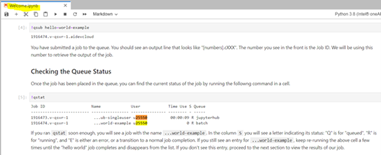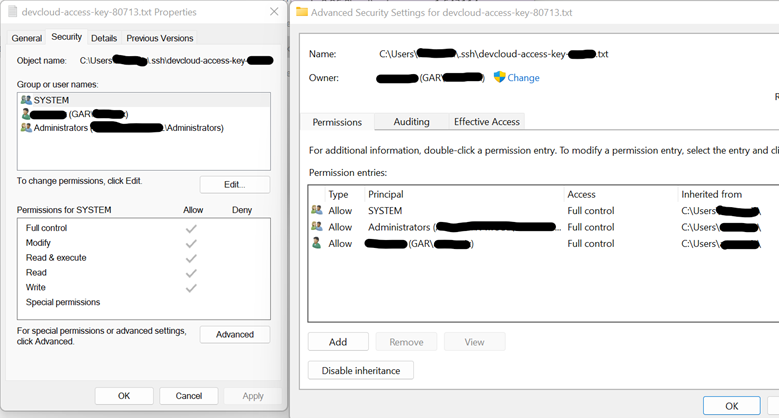Introduction
Intel® Developer Cloud offers complimentary access to a wide range of Intel® architectures to help you get instant hands-on experience with Intel® software and run your edge, AI, high-performance computing (HPC) and rendering workloads. With preinstalled Intel-optimized frameworks, tools, and libraries, you have everything you need to fast-track your learning and project prototyping.
This article describes the self-help collection of troubleshooting techniques for Intel Developer Cloud for oneAPI, which describes a problem and countermeasures for several such situations.
Permission Denied Publickey Error
During setup, the following is the most observed error:
uXXXXX@devcloud: Permission denied (publickey)
Follow these workarounds:
- Make sure that you have given correct permissions to the .ssh folder.
- If this step doesn’t work, delete the existing key and try downloading the key again.
- If you are trying automatic configuration, try manual configuration steps.
- Check whether the Intel Developer Cloud user ID is the same in Jupyter* Notebook and the configuration file.
- Sign in to Intel® Tiber™ AI Cloud.
- Log in and launch Jupyter.
- Note the account number as shown in the following image in the Welcome.ipynb notebook.

- Next, log in with .ssh. If an error does not show up, your account is good.
- If a Permission Denied (Publickey) error message shows up during log in with ssh then:
- Check your .ssh/config: cat .ssh/config.
- Check if your account number in your .ssh/config matches with the one shown in Jupyter (example: 25550).
- Make sure the correct account number is reflected in the configuration file. If not, edit your .ssh/config to correct the account number in .ssh/config to be the same as the one with what you see in Jupyter.
- Login with .ssh again.
- If at any point during the above steps you notice files missing, contact the support team with your original account number and the correct account number. They will work with the engineering team to assist in copying your files over.
Create a New Account After Deactivation
- Make sure that you log out of the Jupyter Notebook associated with the old user ID and clear the cookies and cache.
- In the C:\cygwin64\home\user\.ssh folder, delete known_hosts or rename known_hosts to any other name (example: known_hosts.old).
- Remove all the documents related to your old Intel Developer Cloud account (such as configuration files and setup keys).
Connect to Intel Developer Cloud from macOS*
Error:
If you are a Mac* user and trying to set up Intel Developer Cloud, you must make the following modifications, that is, make x to capital X in your config file in .ssh folder.
Change the following line:
To the following:
ProxyCommand /usr/bin/nc -X 5 -x PROXY_SERVER:PORT %h %p
Connect via OpenSSH
You could encounter the following possible errors while connecting to Intel Developer Cloud via OpenSSH.
Create Process Error: 2
Error:
No dependencies are required if you are connected directly to the internet. However, if your internet service provider or organization requires SSH connections to pass through a proxy server, an additional third-party component is required. As per instructions in this documentation, use the Ncat networking utility from Nmap. Install Nmap from here.
Ncat: Invalid proxy port number "PORT". QUITTING.
Error:
You might see this error if you did not add the path to the Ncat executable in your configuration file. Add a path to the ncat.exe file in your configuration as follows:
ssh: Could not resolve hostname ssh.devcloud.intel.com\302\240: No such host is known.
Error:
ssh: Could not resolve hostname ssh.devcloud.intel.com\302\240: No such host is known. kex_exchange_identification: Connection closed by remote host
Try the following workarounds mentioned to resolve this error:
- Right-click on the downloaded key file, devcloud-access-key-XXXXX.txt, and then open Properties to change the file permissions in the Security tab. Apply the permissions as shown in the following image.

If this does not work, delete the .ssh folder and try creating a new .ssh directory with the config file and downloaded key file. Paste the following content into your config file and try connecting to Intel Developer Cloud from a Windows* terminal again.
Connection via VSCode
After connecting successfully to Intel Developer Cloud via OpenSSH, you might observe the below error:
Error:

Possible workarounds:
- If you are connected to VPN, try disconnecting or adding the following code to your config file, save it, and then reload the VSCode window.
- If you are not behind proxy, add the following line under devcloud-vscode in your config file.